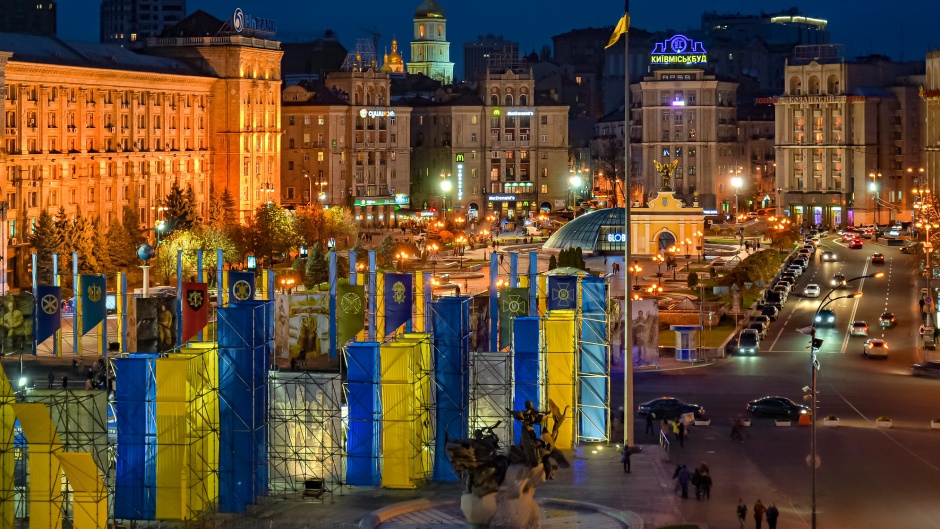How long, oh Lord?
Ukraine’s struggle represents the third phase of the liberation of Europe. It’s outcome cannot be taken for granted.
26 FEBRUARY 2024 · 11:38 CET

Remember the shock and feeling of dread two years ago when we woke up to the news that Putin had mobilised his army to invade Ukraine?
Few of us imagined that the Ukrainian resistance would last long against the feared might of the Russian army. Memories were stirred of the German invasion of the Netherlands in 1940 when the vastly outnumbered Dutch army resisted for four days before surrendering on May 14, immediately after Hitler’s ruthless blitzkrieg destroyed the historic heart of Rotterdam.
My memory was also stirred of my last visit to Maidan, Independence Square in Kyiv, now six years ago, the heart of the Revolution of Dignity in 2013-14 which overthrew the Kremlin’s puppet president, Victor Yanukovych. As I walked among the information boards and sculptures displayed in the square commemorating the momentous and deadly events of those days, I became aware of the unfinished drama being played out on the historic border between east and west.
At the time, I wrote about Ukraine tottering between two destinies: “Maidan represents a hopeful future, in which an engaged church and an informed and sympathetic Europe can play decisive roles. But a dark alternative lurks in the background, of a vassal Ukraine with a church paying homage to a Putin preening himself as the ‘champion of the faith’.”
New mentality
I recall not wanting to follow that dark line of thought any further. What was Putin prepared to do if the democratic experiment on his southern border continued to grow and flourish? He knew it would undermine his own authoritarian rule among the Russian people. Standing among the sculptures, I began to see the significance of this struggle for all of Europe’s future, east and west. Something new was emerging here. What some had begun calling homo maidanus was supplanting the subservient mentality of homo sovieticus. The Maidan protests revealed a new Ukrainian mentality, no longer servile to abusive authority, no longer prepared to support the status quo, nor to live the lie. Homo maidanus insisted on civil and religious freedoms. Maidan had become a symbol of liberty.
Surveying the sprawling square, I tried to imagine the scene back on May 9, 2004, when the band two of my sons played in had been invited by the Dutch embassy in Kyiv to play to 50,000 Ukrainians gathered in Maidan to celebrate Europe Day. While hardly any Dutch person could tell you when and what Europe Day is, 50,000 Ukrainians knew that it commemorated the European integration process and stood for freedom, justice and rule of law, their hoped-for future as part of the European Union!
I became conscious then that what would happen in Ukraine from then onwards would have huge ramifications for the whole of Eurasia: Moravia, Georgia, Armenia, Belarus, and Russia itself.
Second breath
Today we look back over two years with very mixed emotions. We admire the heroic, Churchillian response of Ukraine’s president both to the Russian threat and to western offers for safe evacuation. His resolute defiance inspired his nation. We could hardly believe the reports that followed of kilometre-long files of Russian tanks stopped dead in their tracks, by small, mobile military squads on quads; and later of Russian troops fleeing for their lives, leaving weapons and equipment behind.
Like the Psalmist, we cry to heaven, ‘How long, O Lord?’
Yet seen in the broader perspective of history, Ukraine’s current struggle does parallel the Dutch experience, which partly inspired the American Revolution. It is also the unfinished business of World War Two: overcoming the fateful division of post-war Europe agreed on by Roosevelt and Stalin at Yalta. Starting with the Schuman Plan in 1950, European integration spread from the west to central and eastern Europe when communism imploded and catalysed a second phase of freedom. Ukraine’s struggle represents the third phase of the liberation of Europe. It’s outcome cannot be taken for granted.
Ultimately, the psalmist encourages his readers not to put hope in chariots and horses, tanks and drones, when he concludes: But I trust in your unfailing love; my heart rejoices in your salvation.
Jeff Fountain, Director of the Schuman Centre for European Studies. This article was first published on the author's blog, Weekly Word.
Published in: Evangelical Focus - Window on Europe - How long, oh Lord?
